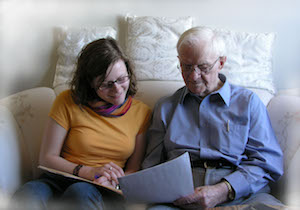Student Fieldworkers
 If you are a student conducting a fieldwork interview for Folklore course purposes, please have your interviewee(s) complete the Interview Agreement form (one agreement form per interviewee.)
If you are a student conducting a fieldwork interview for Folklore course purposes, please have your interviewee(s) complete the Interview Agreement form (one agreement form per interviewee.)- Please complete the Depositor form if you are a collector donating your materials to the Archives.
- If you are taking picture or video recording for a Kule Folklore Centre project, use this Photo/video Release form.
Specific recommendations on recording and submitting audio files to the Archives:
- Digital audio recording has many advantages over old analog cassette equipment. However the downside to digital recording is that there are no simple solutions for preserving your audio files. Every choice you make will force other decisions down the road, especially if you are interested in preserving your recordings over the long term.
- We recommend using digital audio recorders that can create standard, uncompressed audio files in the WAV file format. WAV files are large, uncompressed, high-quality, standard digital audio files. Since WAV files are uncompressed they have better audio fidelity than recordings made using many compressed formats. In addition, since the WAV format is a digital audio standard, any audio editing or playback program should be able to open them. This is an important consideration to be aware of when you want to preserve your recordings over the long term.
- The quality of digital audio recordings is affected by a number of factors. Two factors that have the greatest impact on the quality of a digital audio recording are the bit depth and sampling rate of the digital audio file. We recommend creating files that are 24 bit, with a sampling rate of 96 kHz.
- You can submit your fieldwork to the Archives on a USB or SD card.
Adapted from the field guide of the Vermont Folklife Centre "Field Recording in the Digital Age"